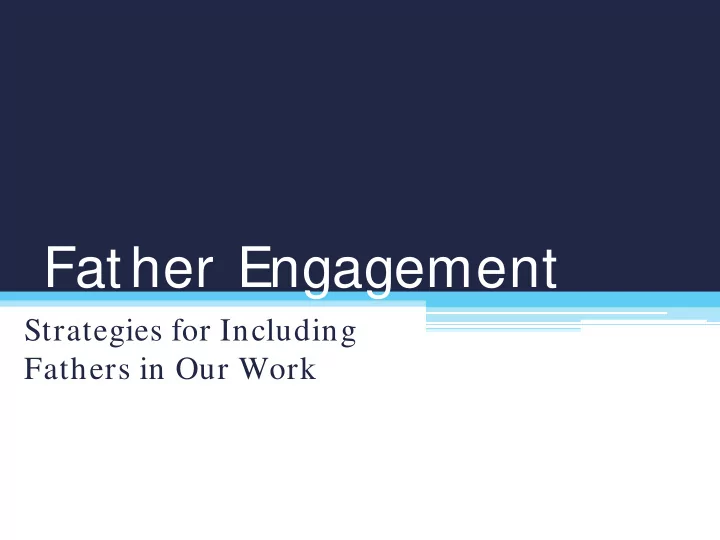

Father Engagement Strategies for Including Fathers in Our Work
Obj ectives • Identify strategies to engage fathers more effectively in public health programming • Identify existing programs that are successful in reaching young fathers • Discuss how to propose strategies to be more inclusive of male participants in our work
Importance of Father Involvement Cognitive Developm ent • Infants more cognitively competent • Toddlers are better problem solvers • Higher IQ by age 3 • Better academic achievers (Allen and Daly, 2007)
Continued.. Em otional Developm ent • Infants more likely to be securely attached • More resilient in stressful situations • More eager to explore their environment • Less depression • Greater internal locus of control (Allen and Daly, 2007)
Continued.. Other Benefits • More likely to provide economic support • More likely to positively socialize with the mother. • Attached Children have more self-confidence and less anxiety. (National Family Preservation Network, 2012)
Common Barriers to Engagement Mother of the Child • Refusal to identify the father • Not wanting the father to be involved • “ Gatekeeper” role • Som etim es the m other has valid reasons to keep the father aw ay (National Family Preservation Network, 2012)
Continued… Fathers not living with the child • 1 in 3 children reside without their biological father • More than 20 million children in the US • Very common among teen fathers (US Census Bureau, 2013)
Continued… Good Father vs Bad Father Perspective • Tendency to label fathers as “all good” or “all bad” • This can impact a worker’s interactions with a father • Mother’s with bad relationships can have a strong influence with this perspective. (Maxwell, Scourfield, Featherstone, Holland, and Tolman, 2012)
Continued… Child Welfare Traditional Practices • Most workers focus on the mother • Tendency to exclude fathers or make little effort to include them • Assumption of mother being the primary caretaker ( Maxwell et al. , 2012)
Continued… Fathers as reluctant clients • Some tend to avoid child protections workers • Fear of investigation, judgement, or criticism of parenting. • Past experiences can also contribute to their reluctance. (Maxwell et al. , 2012)
S trategies to Engage Early Identification and Involvem ent • Invite fathers early in the process • Ask mothers about fathers early and encourage their participation • Early involvement corresponds with higher engagement in the future ( Maxwell et al. , 2012)
S trategies to Engage Make services relevant to fathers • Addressing employment issues • Fathers prefer activity based approaches vs classroom based. • ASK fathers what they want/ need (Maxwell et al. , 2012)
S trategies to Engage Deal with our own biases • Assume the dad wants to be involved • Treat each case on an individual basis • Suspend judgements and listen to all sides
S trategies to Engage Becom e Dad Friendly • Does paperwork ask for father information? • Do brochures include pictures of fathers? • Do you make equal eye contact with both parents during meetings? • Do you ask mom and dad specific questions? • Do you positively reinforce dad’s involvement?
MI-APPP: “ The Parenthood Program” • Serving Pregnant & Parenting Teens ▫ 2 Lead Case Managers; 1 Case Manager Asst. ▫ Engaged over 30 teen parents • Servicing Mothers & Fathers ages 13-21 • Goal: Engage over 12 teen Fathers; Currently at 6 • Strength Based Case Management
Our Father’s Accomplishments • 3 Fathers have graduated from H.S. • 3 Fathers are currently employed • 2 Fathers currently planning for College • All active Fathers in MI-APPP are fully engaged in their child's life • 100% success rate with our Fathers developing new healthy supports and building new relationships
Tips Working With Teen Fathers • Hiring Male Staff • Teen Fathers value relationships more than programming • Keep the teen Father involved with program planning • Provide incentives • Identifying their support • Outings & activities of their interest (i.e. Attending Sporting Events, Going to the gym, playing video games)
Barbershop Talks
Video • Early Head Start program in Vermont • Current program successfully engaging fathers • http:/ / youtu.be/ Ep-GqhronTU
References Allen, S., & Kerry, D. (2007) The effects of father involvement: An updated research summary of the evidence. Retrieved from http:/ / www.fira.ca/ cms/ documents/ 29/ Effects_of_Father_Involvement.pdf National Family Preservation Network, (2012), IFPS guide to father involvem ent. Retrieved from http:/ / www.nfpn.org/ Portals/ 0/ Documents/ ifps-father-guide.pdf U.S. Census Bureau. “America’s families and living arrangements. (2013). Washington DC: U.S. Census Bureau, 2013. Retrieved from http:/ / www.census.gov/ hhes/ families/ data/ cps2013.html Maxwell, N., Scourfield, J., Featherstone, B., Holland, S. and Tolman, R. (2012) Engaging fathers in child welfare services: A narrative review of recent research evidence. Child and Fam ily Social Work , 17 (2): 160-169. Retrieved from http:/ / onlinelibrary.wiley.com/ doi/ 10.1111/ j.1365- 2206.2012.00827.x/ abstract
Recommend
More recommend